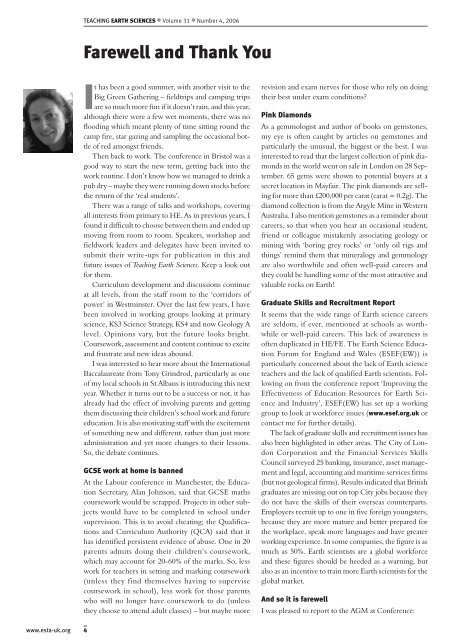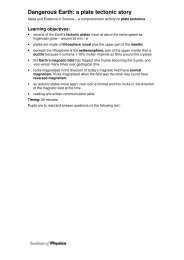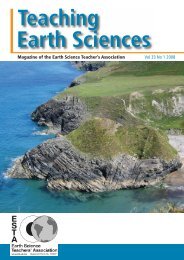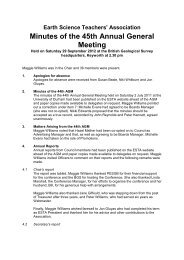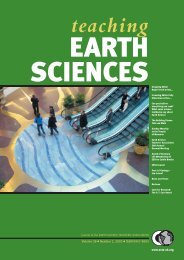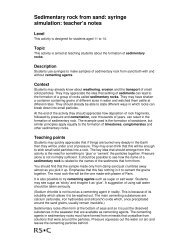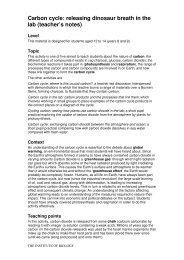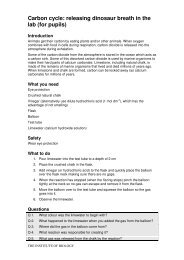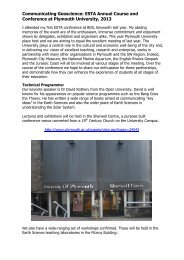teaching - Earth Science Teachers' Association
teaching - Earth Science Teachers' Association
teaching - Earth Science Teachers' Association
Create successful ePaper yourself
Turn your PDF publications into a flip-book with our unique Google optimized e-Paper software.
TEACHING EARTH SCIENCES ● Volume 31 ● Number 4, 2006<br />
Farewell and Thank You<br />
It has been a good summer, with another visit to the<br />
Big Green Gathering – fieldtrips and camping trips<br />
are so much more fun if it doesn’t rain, and this year,<br />
although there were a few wet moments, there was no<br />
flooding which meant plenty of time sitting round the<br />
camp fire, star gazing and sampling the occasional bottle<br />
of red amongst friends.<br />
Then back to work. The conference in Bristol was a<br />
good way to start the new term, getting back into the<br />
work routine. I don’t know how we managed to drink a<br />
pub dry – maybe they were running down stocks before<br />
the return of the ‘real students’.<br />
There was a range of talks and workshops, covering<br />
all interests from primary to HE. As in previous years, I<br />
found it difficult to choose between them and ended up<br />
moving from room to room. Speakers, workshop and<br />
fieldwork leaders and delegates have been invited to<br />
submit their write-ups for publication in this and<br />
future issues of Teaching <strong>Earth</strong> <strong>Science</strong>s. Keep a look out<br />
for them.<br />
Curriculum development and discussions continue<br />
at all levels, from the staff room to the ‘corridors of<br />
power’ in Westminster. Over the last few years, I have<br />
been involved in working groups looking at primary<br />
science, KS3 <strong>Science</strong> Strategy, KS4 and now Geology A<br />
level. Opinions vary, but the future looks bright.<br />
Coursework, assessment and content continue to excite<br />
and frustrate and new ideas abound.<br />
I was interested to hear more about the International<br />
Baccalaureate from Tony Grindrod, particularly as one<br />
of my local schools in St Albans is introducing this next<br />
year. Whether it turns out to be a success or not, it has<br />
already had the effect of involving parents and getting<br />
them discussing their children’s school work and future<br />
education. It is also motivating staff with the excitement<br />
of something new and different, rather than just more<br />
administration and yet more changes to their lessons.<br />
So, the debate continues.<br />
GCSE work at home is banned<br />
At the Labour conference in Manchester, the Education<br />
Secretary, Alan Johnson, said that GCSE maths<br />
coursework would be scrapped. Projects in other subjects<br />
would have to be completed in school under<br />
supervision. This is to avoid cheating; the Qualifications<br />
and Curriculum Authority (QCA) said that it<br />
has identified persistent evidence of abuse. One in 20<br />
parents admits doing their children’s coursework,<br />
which may account for 20-60% of the marks. So, less<br />
work for teachers in setting and marking coursework<br />
(unless they find themselves having to supervise<br />
coursework in school), less work for those parents<br />
who will no longer have coursework to do (unless<br />
they choose to attend adult classes) – but maybe more<br />
revision and exam nerves for those who rely on doing<br />
their best under exam conditions?<br />
Pink Diamonds<br />
As a gemmologist and author of books on gemstones,<br />
my eye is often caught by articles on gemstones and<br />
particularly the unusual, the biggest or the best. I was<br />
interested to read that the largest collection of pink diamonds<br />
in the world went on sale in London on 28 September.<br />
65 gems were shown to potential buyers at a<br />
secret location in Mayfair. The pink diamonds are selling<br />
for more than £200,000 per carat (carat = 0.2g). The<br />
diamond collection is from the Argyle Mine in Western<br />
Australia. I also mention gemstones as a reminder about<br />
careers, so that when you hear an occasional student,<br />
friend or colleague mistakenly associating geology or<br />
mining with ‘boring grey rocks’ or ‘only oil rigs and<br />
things’ remind them that mineralogy and gemmology<br />
are also worthwhile and often well-paid careers and<br />
they could be handling some of the most attractive and<br />
valuable rocks on <strong>Earth</strong>!<br />
Graduate Skills and Recruitment Report<br />
It seems that the wide range of <strong>Earth</strong> science careers<br />
are seldom, if ever, mentioned at schools as worthwhile<br />
or well-paid careers. This lack of awareness is<br />
often duplicated in HE/FE. The <strong>Earth</strong> <strong>Science</strong> Education<br />
Forum for England and Wales (ESEF(EW)) is<br />
particularly concerned about the lack of <strong>Earth</strong> science<br />
teachers and the lack of qualified <strong>Earth</strong> scientists. Following<br />
on from the conference report ‘Improving the<br />
Effectiveness of Education Resources for <strong>Earth</strong> <strong>Science</strong><br />
and Industry’, ESEF(EW) has set up a working<br />
group to look at workforce issues (www.esef.org.uk or<br />
contact me for further details).<br />
The lack of graduate skills and recruitment issues has<br />
also been highlighted in other areas. The City of London<br />
Corporation and the Financial Services Skills<br />
Council surveyed 25 banking, insurance, asset management<br />
and legal, accounting and maritime services firms<br />
(but not geological firms). Results indicated that British<br />
graduates are missing out on top City jobs because they<br />
do not have the skills of their overseas counterparts.<br />
Employers recruit up to one in five foreign youngsters,<br />
because they are more mature and better prepared for<br />
the workplace, speak more languages and have greater<br />
working experience. In some companies, the figure is as<br />
much as 50%. <strong>Earth</strong> scientists are a global workforce<br />
and these figures should be heeded as a warning, but<br />
also as an incentive to train more <strong>Earth</strong> scientists for the<br />
global market.<br />
And so it is farewell<br />
I was pleased to report to the AGM at Conference:<br />
www.esta-uk.org<br />
4


